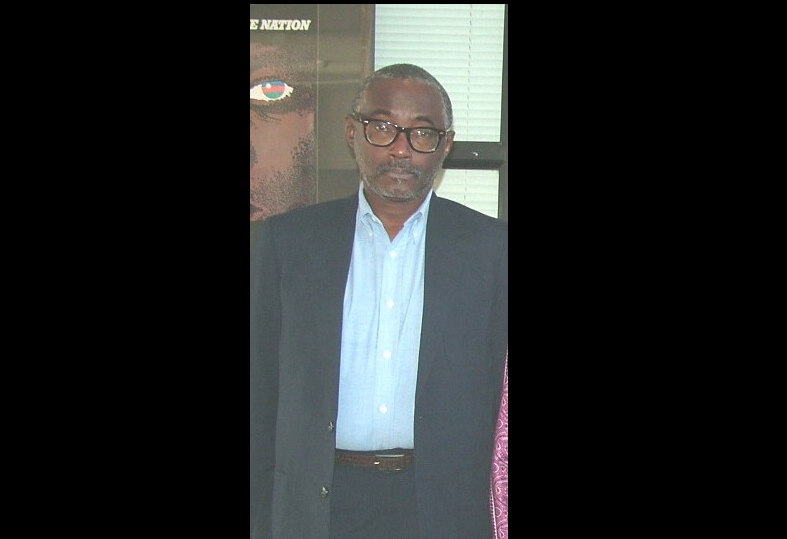Farewell, Elder Bankie F. Bankie

Bankie was a Pan-Africanist in his own class. He would not want Pan-Africanists to fall into sentimentalism about his passing on to the Ancestral world. Rather he would want us to dedicate our work to the liberation of the African people, particularly working towards black people’s knowledge of self.
Activist Romona Epifania Hidileko, who worked very closely with the late elder Bankie F. Bankie at the National Youth Council (NYC), delivered the news that our Pan African teacher and guide has departed from this earth.
Indeed, he has proceeded into the ancestry from where, as African spirituality guides us, he will be watching over us. With the defeat of African spirituality, there is only one way to react and interpret death – the European missionary interpretation.
Thomas Sankara, one of Africa’s greatest revolutionaries, helped us deal with death. Listen to how he guided the people of Burkina Faso, on 19 October 1986, following the death of Samora Machel, then revolutionary leader of Mozambique: “avoid falling into sentimentalism… with sentimentalism one cannot understand death. Sentimentalism belongs to the messianic vision of the world, which, since it expects a single man to transform the universe, inspires lamentation, discouragement and despondency as soon as this man disappears. Samora Machel is dead. His death must serve to enlighten and strengthen us as revolutionaries . . . I ask you to name streets, buildings and so on after Samora Machel over the whole expanse of our territories, because he deserves it.”
Similarly, Bankie is dead. His death must enlighten and strengthen us as Pan-Africanists. Bankie was a Pan-African activist in his own class. He would not want us, I believe, to fall into sentimentalism. He would want us to dedicate our work to the liberation of the African people, particularly towards black people’s knowledge of self.
The best we can do is to recall his ideas, thoughts and principles for reflection and action. It is for us to think about our engagements with him for reflections and safekeeping for he is gone for good into ancestry.
Although I understood the struggles of the African people and constantly sought personal development of my objective and subjective consciousness when I left Iipumbu Secondary School for the University of Namibia after 2005, I had not reached a refined understanding and appreciation of Pan-Africanism until I met and had a personal relationship with Bankie. He taught me Pan–Africanism.
I was not alone; there were with many others, such as Etuna Jakobus Joshua and Shidumifa Lot Ndamanomhata. He had many students under his Pan-African tutelage before us. Many of them hold high positions in society today. The best universal reflection of Bankie, therefore, is that of a Pan-African activist, Pan-Africanist teacher and compass for those of us who got closer to him.
It must be clarified that he did not teach us Pan-Africanism in classrooms, but through personal, social and political encounters. Bankie had successfully integrated himself with the youth.
Politics aside, Mandela Kapere assisted a great deal in this integration by finding a place for Bankie at the NYC. This has been a significant development in Bankie’s Pan-Africanist work in Namibia. Kapere, therefore, played an important role in the work of our teacher within the small circles of Pan African youth.
Bankie was an action-orientated teacher. He loved us dearly. In 2010, he took me out of the World Youth Festival in Pretoria to meet the freedom fighters of the Sudan People’s Liberation Movement (SPLM). At that time the people of South Sudan were still fighting for independence from Khartoum. The ANC had given diplomatic status to the SPLM.
He had long hours of discussion with Dr John Gai and Sabir Ibrahim, who then ran the office. When South Sudan got independence, he asked me to accompany him to a workshop in Addis Ababa to meet with African activists, including those from the newly independent South Sudan dealing with the questions of the challenges of decolonisation.
Bankie was passionate about the struggles of the people of South Sudan. He introduced us to the problem of ‘Islamisation’ and the ‘Arabisation’ of Africa, with Sudan being a case study. He often, in private conversations, chastised the Swapo elites for prioritising the struggle of Palestine over the struggle of people of South Sudan.
He had the following to say about Pan Africanism in Namibia: “In Namibia the youth are disinterested in Africa and its Diaspora. It will come eventually, but it’s two to three generations away. PACON failed its mission of disseminating Pan-Africanism. I wanted to resign from its Eminent Board in 2005 but was asked to stay on. Despite many efforts to change its board, the powers-that-be have insisted on keeping the board. During the armed phase of the struggle Swapo was generally felt to lack ideological direction. We are paying the costs of that now.”
What we must do, as Pan Africanists, is to continue the activism of elder Bankie. I will continue to make him proud with my little efforts as Commissioner of the African Diaspora and External Affairs. I will work with African activists in the Diaspora.
Although he may not be around to call me to his house for hours and hours of discussions, I will forever cherish our time together, avoid falling into sentimentalism, and complete his task. Our Pan-African guide will continue watching over us, from ancestry.
* JOB SHIPULULO AMUPANDA is a commissioner for the African Diaspora and External Affairs of the African Youth Commission and a political science lecturer at the University of Namibia.
* THE VIEWS OF THE ABOVE ARTICLE ARE THOSE OF THE AUTHOR AND DO NOT NECESSARILY REFLECT THE VIEWS OF THE PAMBAZUKA NEWS EDITORIAL TEAM
* BROUGHT TO YOU BY PAMBAZUKA NEWS
* Please do not take Pambazuka for granted! Become a Friend of Pambazuka and make a donation NOW to help keep Pambazuka FREE and INDEPENDENT!
* Please send comments to [email=[email protected]]editor[at]pambazuka[dot]org[/email] or comment online at Pambazuka News.
